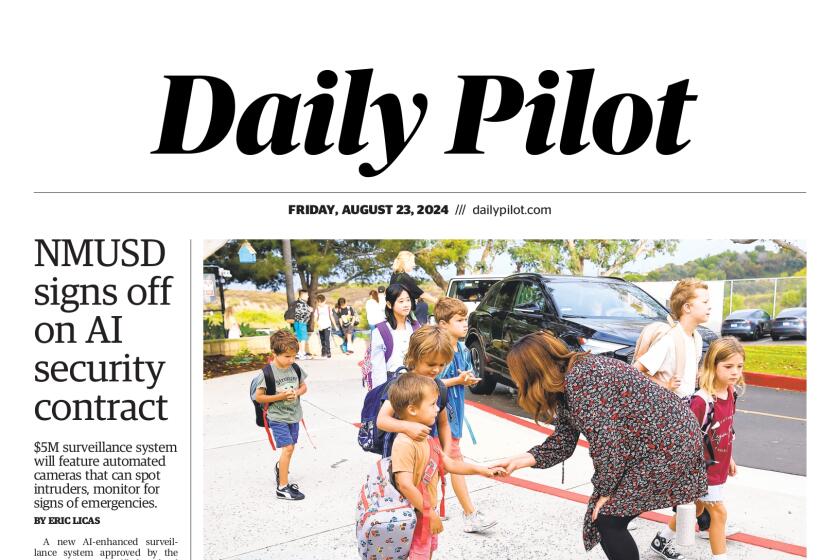School layoffs OKd
The Newport-Mesa Unified School District’s Board of Education on Tuesday approved $12 million in cuts, setting in motion the eventual elimination of more than 120 full-time positions, more than half of them elementary school teachers, high school counselors and English as a Second Language instructors at the district’s adult education program.
The pair of resolutions, which called for layoffs in both classified and certificated positions, were unanimously approved by the board to balance the 2010-11 budget in the face of state cutbacks and declining property tax revenues locally.
“It is with heavy heart that we make these recommendations,” said Supt. Jeffrey Hubbard moments before the seven-member board voted. “It is, unfortunately, the world in which we find ourselves today. There’s a true crisis going on in public education. ... In spite of this horrible context, we have to correct our budgetary woes.”
Now the district will start to notify all of those employees who will lose their jobs, something that must be done by mid-March in order to become effective by mid-May, said Laura Boss, spokeswoman for the district.
“This was inevitable,” she said after the meeting. “We’ve done everything we could do up until this point, but there’s not much you can do when the state takes away $12 million from you.”
Each year, the district has come to rely on the state for something called “categorical funding.”
As the name suggests, it’s money that can be used only for certain categories and positions, whether it’s to pay the salaries of high school counselors, hire elementary school teachers who work in socially and economically diverse schools or foot the bill for adult education classes.
But this year the state is withdrawing its categorical funding to the tune of $12 million, which roughly equals a loss of $568 per student in the district, Boss said.
And if the state’s economic climate does not improve, those funds will not be available in the near future, a dilemma that’s putting hundreds of school districts across the state in somewhat of a quandary, Boss said.
Making matters worse is the fact that the school district’s $280-million budget is funded primarily by property tax revenues, and those revenues have either flat lined or declined in the past few years, giving the school district even less money to work with than it has had historically, Boss said.
Last year, for example, the district had to cut $11 million from its budget, she said.
The year before that the district had to do away with $8 million.
This year, however, was the first time where the cutbacks resulted in the elimination of positions.
Now add to the fiscal equation the uncertainty of future costs in health care.
An additional $1.5 million in cuts had to be made on top of the $12 million in order to meet an unfunded obligation to the 2,600 employees belonging to either the teacher’s union or the California School Employees Assn. The money represents a 6% projected increase in health costs, although the district is not sure yet how much the health-care costs will actually increase.
“It’s a contractual agreement made a few years ago,” Boss said. “This is a pool of money that’s being set aside for the employees.”
Hardest hit in the cuts, if anecdotes are any sort of indication, are the elementary school teachers who are fresh out of college and the district’s adult education program, where ESL classes will be eliminated for English-limited speaking parents, said Kimberly Claytor, president of the Newport-Mesa Federation of Teachers.
By the end of June, a 40-person staff at the district’s adult education program will be reduced to a handful of teachers at the Burbot Educational Support Services and Teaching Center, at 2045 Meyer Place in Costa Mesa.
The Work Force Readiness Program, which helps students and adults prepare for careers, also will be eliminated, leaving the adult education program with only “a bare bones” version of a High School Diploma Program, officials said.
That program helps students who are having a hard time academically.
According to Martha Rankin, lead administrator of the adult education program, more than 5,000 students pass through the halls of adult education each year, but that number now will be reduced significantly.
All the latest on Orange County from Orange County.
Get our free TimesOC newsletter.
You may occasionally receive promotional content from the Daily Pilot.



